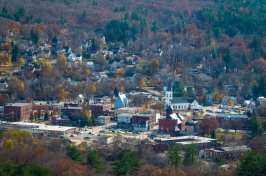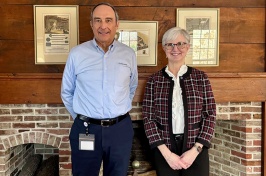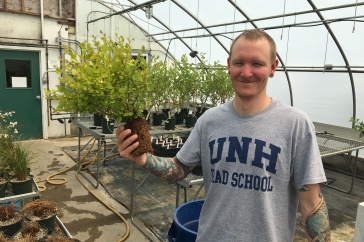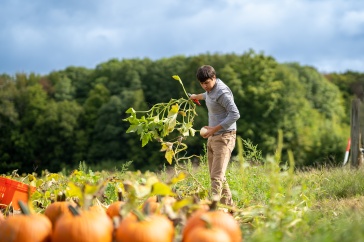
Heifers graze in a silvopasture area at UNH's Organic Dairy Research Farm.
How can New England, one of the nation’s most forested regions, produce more local, sustainable food while maintaining those forests’ many benefits?
That’s the question UNH researchers aim to answer with a new project that studies integrating crop and animal farming in forested areas for enhanced food production, carbon sequestration and climate resilience. The five-year project, called Promoting Climate-Smart Sustainable Agriculture in New England through Regionally Adapted Agroforestry Systems (ADAPT), is funded with a $10 million grant from the United States Department of Agriculture.
“Approximately 75% of New England is made up of forests, which can be challenging when trying to expand farming opportunities to meet the growing need for more sustainable ways to produce locally grown food.”
“Approximately 75% of New England is made up of forests, which can be challenging when trying to expand farming opportunities to meet the growing need for more sustainable ways to produce locally grown food,” says Heidi Asbjornsen, professor of natural resources and the environment and principal investigator for the project. “But those forests also need to be preserved because they are a globally important carbon sink that absorbs and stores about 4.6 billion tons of carbon dioxide each year, so we’re looking to develop ways to expand agriculture opportunities while also preserving that carbon storage which is crucial when addressing climate change.”
ADAPT will study agroforestry—the practice of integrating crop and animal farming in forested areas—to blend the two farming strategies into one united solution that reduces impacts on ecosystems and balances sustainable agriculture with climate mitigation, adaptation and resilience.
ADAPT will focus on three types of agroforestry suitable for the New England landscape:
- silvopasture, which combines trees, pastures and livestock on the same land to provide multiple goods and services;
- polyculture, which refers to systems that integrate trees and shrubs with diverse non-woody plant species to promote interactions that can increase productivity and resilience in urban food-forests and home gardens—examples include alley cropping, windbreaks and buffers along waterways that can protect nearby rivers, streams and wetlands;
- forest farming systems, where intermediate-to high-shade tolerant crops are cultivated beneath a forest canopy so landowners can harvest timber as well as non-timber products, including medicinal plants, tree syrups, mushrooms and other wild edible and floriculture crops.
In the long term, researchers anticipate that this project will contribute to increasing local food production in New England by 15% and annual carbon sequestration by five million tons; will foster new agroforestry market opportunities; and will enhance New England’s capacity to balance food production with the benefits that forests provide.
“Other regions in the country have done similar research on agroforestry but there really hasn’t been a lot of related research here in New England which makes it challenging to make informed decisions,” says Asbjornsen. “One of our goals with this project is to establish a center for agroforestry research, education and extension, which would also offer a training program in agroforestry for landowners, producers, managers, educators and other decision-makers focused on adapting agroforestry practices to the New England landscape.”
UNH will partner with Dartmouth College and Yale University to bring a range of complementary resources and expertise. The three-pronged approach is to co-develop, implement and evaluate climate resilient agroforestry systems. UNH’s Cooperative Extension forestry and agricultural teams will provide training and technical support in agroforestry practices across diverse populations. Researchers will provide education to enhance knowledge of agroforestry as a climate-smart strategy to mitigate greenhouse gas emissions, increase market opportunities and enhance regionally appropriate climate adaptation and resilience.
Co-principal investigators include Steve Roberge, Alexandra Contosta and Kate Guerdat, all from UNH; Theresa Ong from Dartmouth University; and Mark Ashton from Yale University.
-
Written By:
Robbin Ray ’82 | UNH Marketing | robbin.ray@unh.edu | 603-862-4864
-
Compiled By:
Beth Potier | UNH Marketing | beth.potier@unh.edu | 2-1566

















































